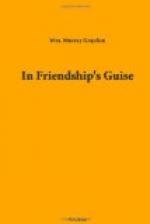“Will you and Mr. Royle excuse me, father?” she said. “I know you want to smoke.”
“I hope you are not going to desert us, Miss Foster,” Nevill replied. “Your company is preferable to the best cigar.”
“We will go up stairs and smoke,” said Stephen Foster. “Come, Royle; my daughter would rather play the piano.”
The library, whither Nevill accompanied his host, was on the second floor front. It was a cozy room, trimmed with old oak, with furniture to match, lined with books and furnished with rare engravings and Persian rugs. Stephen Foster lighted the incandescent gas-lamp on the big table, drew the window curtains together, and closed the door. Then he unlocked a cabinet and brought out a box of Havanas, a siphon, a couple of glasses, and a bottle of whisky and one of Maraschino.
“Sit down, and help yourself,” he said. “Or is it too early for a stimulant?”
Nevill did not reply; he was listening to the low strains of music from the floor beneath, where Madge was at the piano, singing an old English ballad. He hesitated for a moment, and dropped into an easy chair. Stephen Foster drew his own chair closer and leaned forward.
“We are quite alone,” he said, “and there is no danger of being overheard or disturbed. You intimated that you had something particular to say to me. What is it? Does it concern our little—”
“No; we discussed that after we left the train. It is quite a different matter.”
Nevill’s usual self-possession seemed to have deserted him, and as he went on with his revelation he spoke in jerky sentences, with some confusion and embarrassment.
“That’s all there is about it,” he wound up, aggressively.
“All?” cried Stephen Foster.
He got up and walked nervously to the window. Then he turned back and confronted Nevill; there was a look on his face that was not pleasant to see, as if he had aged suddenly.
“Is this a jest, or are you serious?” he demanded, coldly. “Do I understand that you love my daughter?—that you wish to marry her?”
“I have told you so plainly. You must have known that I loved her—you cannot have been blind to that fact all this time.”
“I have been worse than blind, Nevill, I fear. Have you spoken to Madge?”
“No; I never had a chance.”
“Do you consider yourself a suitable husband for her?”
“Why not?” Nevill asked; he was cool and composed now. “If you are good enough to be her father, am I not worthy to be her husband?”
“Don’t say that,” Stephen Foster answered. “You are insolent—you forget to whom you are speaking. Whatever our relations have been and are, whatever sort of man I am at my desk or my ledgers, I am another person at home. Sneer if you like, it is true. I love my daughter—the child of my dead wife. She does not know what I do in town—you are aware of that—and God forbid that she ever does learn. I want to keep her in ignorance—to guard her young life and secure her future happiness. And you want to marry her!”




